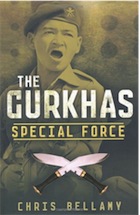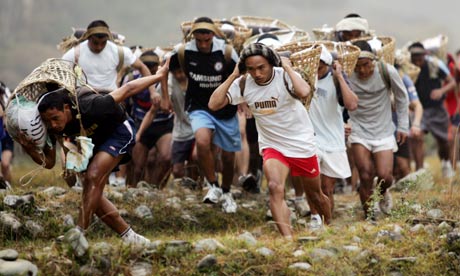- Tony Gould
- The Observer,
- Article history
- The Gurkhas: Special Force
- by Chris Bellamy

- Buy it from the Guardian bookshop

Above: a group of prospective Gurkas run the doko race at Pokhara, part of the gruelling selection process. Photograph: Graeme Robertson
It used to be said that theses on Moby-Dick had replaced whaling as New England's major industry. Similarly, it could now be said that the fewer the Gurkhas serving in the British army, the more books are written about them (I should know, as I wrote one of them). Many of these are written by ex-Gurkha officers. But Chris Bellamy is not an ex-Gurkha; he used to be a defence correspondent – "a dying breed", as he calls it – and has also been a professor of military studies.
The Gurkhas: Special Force is thoroughly researched and clearly written. By and large it sticks to conventional military history, covering the many campaigns and battles in which Gurkhas have fought over a period of almost 200 years (and providing a number of useful maps of these). The text is studded with the Victoria Cross citations of individual British officers and after 1911, the year in which VCs were made available to non-British troops, Gurkhas as well.
Professor Bellamy's grasp of military theory and in particular Russian history enables him to put the "Great Game" and the 19th, 20th and 21st-century wars in Afghanistan in illuminating context. He also has an interesting chapter on Gurkhas – or Gorkhas, as they're more phonetically called – in the post-independence Indian army, where their numbers have expanded in inverse proportion to their contraction in the British army; so that while the four British Gurkha regiments have been reduced to the single Royal Gurkha Rifles, all six of the Gurkha regiments that went to India continue to flourish intact and the 11th Gurkha Rifles, which was raised during the first world war and did not long survive it, has been revived.
Bellamy does have an axe to grind and this is reflected in his subtitle. His mildly controversial thesis is that Gurkhas have always been used as "special forces", not just in such obvious examples as Orde Wingate's Chindits in Burma during the second world war. From their "irregular" beginnings in the army of the East India Company, as "scouts" through the earlier wars in Afghanistan and on the North-West Frontier correctof India (now Pakistan) and in the Borneo campaign of the 1960s, right up to the present conflict in Afghanistan, Gurkhas have often been called to perform "specialised" roles and have responded superbly.
Bellamy may be a little over-insistent on this theme – characterising the four Gurkha regiments involved in the "Emergency" in Malaya and "Confrontation" in Borneo as "the British Foreign Legion", for instance. As a corrective to the once commonly held view that Gurkhas were none too bright and lacked initiative when deprived of their British officers, he certainly has a point. And he is scrupulous enough to quote against himself the "common-sense view" of an unimpeachable authority "that all operations of war are 'special', in one way or another, and that, apart from those carried out by very small groups, all operations by large bodies of men should be regarded as 'conventional'". These words of wisdom come from perhaps the greatest British general of the second world war, Bill Slim.
That the British Gurkhas have survived into the 21st century is largely because of difficulties in recruiting adequate (both in numbers and in calibre) British nationals. Now, as ever in a recession, recruitment here is not so much of a problem and voices are once again being raised for the Gurkhas to go before any more British regiments are scrapped or amalgamated. Bellamy quotes the Tory MP and ex-army officer Patrick Mercer, interviewed in this newspaper on 29 August 2010, saying: "The first people to go will be the Brigade of Gurkhas, probably in their entirety. In the past, the Gurkhas' existence was guaranteed by the fact they are cheaper to run than British troops, and that there was a shortage of British troops. Recent changes mean they are now just as expensive, and recruitment is extremely healthy at the moment. I am afraid the writing is on the wall."
By emphasising the special forces element of the Gurkhas – their "frequent association with the Paras", for example – Bellamy makes a strong case for their retention, now that the wars the British army is called on to fight demand precisely these kind of skills. But the fate of the Gurkhas does not rest entirely in the hands of the British government. What Bellamy calls the "unstable political situation in Nepal" may play a part, too. They are living on the edge in more senses than one.
Tony Gould is the author of Imperial Warriors: Britain and the Gurkhas
Δεν υπάρχουν σχόλια:
Δημοσίευση σχολίου